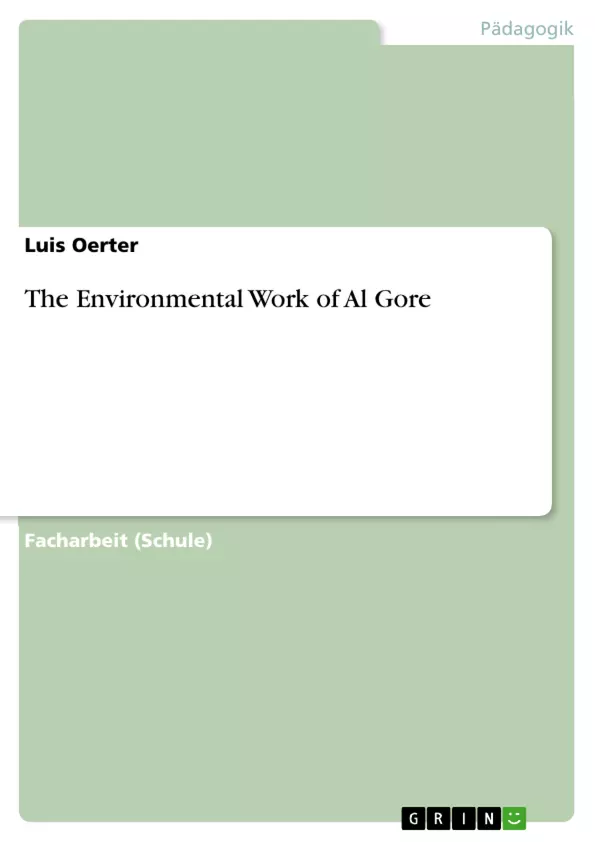Die Arbeit befasst sich mit der politischen und persönlichen Entwicklung des ehemaligen US-Vizepräsidenten und Präsidentschaftskandidaten Al Gore. Hierbei wird ein besonderer Schwerpunkt auf sein Engagement für den Umweltschutz gelegt.
Inhaltsverzeichnis
- 1. Introduction
- 2. Al Gore's Childhood and Education
- 2.1 Early Years and School
- 2.2 Harvard and Military Service
- 3. Al Gore Starting a Political Career and Environmental Activism
- 3.1 The House of Representatives and Senatorial Dignity
- 3.2 First Run for Presidency
- 4. Gore as Vice President
- 4.1 The Rio Summit
- 4.2 Green Gore in the White House
- 4.3 Second Legislative Period as Vice President
- 4.3.1 Gentle Environmentalism
- 4.3.2 The Kyoto Summit
- 5. Al Gore's Life after Vice Presidency
- 5.1 Second Presidential Run
- 5.2 Environmental Projects
- 5.2.1 Generation Investment Management
- 5.3 An Inconvenient Truth
- 5.4 Live Earth
Zielsetzung und Themenschwerpunkte
Diese Seminararbeit untersucht Al Gores Engagement im Umweltschutz, von seinen frühen Jahren bis zu seinen späteren Aktivitäten nach seiner Zeit als Vizepräsident. Die Arbeit analysiert Gores politische Karriere im Kontext seines Umweltbewusstseins und beleuchtet seine Erfolge und Herausforderungen im Kampf gegen den Klimawandel.
- Al Gores politische Karriere und deren Einfluss auf seine Umweltpolitik
- Gores persönliche Entwicklung und sein wachsendes Umweltbewusstsein
- Die Herausforderungen und Erfolge seiner Umweltinitiativen
- Der Einfluss von Gores Arbeit auf die öffentliche Meinung zum Klimawandel
- Gores anhaltende Bemühungen im Umweltschutz nach seiner politischen Karriere
Zusammenfassung der Kapitel
1. Introduction: Die Einleitung stellt die Bedeutung der USA im Kampf gegen den Klimawandel heraus und hebt Al Gores Rolle als Schlüsselfigur im Wandel des amerikanischen Umweltbewusstseins hervor. Sie führt in die Thematik ein und formuliert die zentrale Forschungsfrage: Was hat Al Gore getan – und tut er immer noch – um unsere Umwelt zu retten?
2. Al Gore's Childhood and Education: Dieses Kapitel beschreibt Gores Kindheit und Jugend im Kontext der politischen Karriere seines Vaters. Es beleuchtet seine Ausbildung an renommierten Schulen und an der Harvard Universität, sowie seinen Militärdienst und die damit verbundenen Erfahrungen, die seinen späteren Weg prägten. Die Arbeit an der Familienfarm wird als möglicher Einfluss auf sein Umweltbewusstsein angeführt.
3. Al Gore Starting a Political Career and Environmental Activism: Dieses Kapitel schildert den Beginn von Gores politischer Karriere im Repräsentantenhaus und später im Senat. Es analysiert seine frühen Engagements im Umweltschutz, die oft von politischen Kompromissen geprägt waren. Sein erster Präsidentschaftswahlkampf wird im Hinblick auf das Fehlen von umfassenden Umweltzielen kritisch beleuchtet.
4. Gore as Vice President: Dieses Kapitel konzentriert sich auf Gores Zeit als Vizepräsident unter Präsident Clinton. Es beleuchtet seine Rolle beim Rio-Gipfel und andere Initiativen im Weißen Haus. Die beiden Amtsperioden als Vizepräsident werden im Detail untersucht, mit besonderer Berücksichtigung des Kyoto-Protokolls und der Herausforderungen bei der Durchsetzung einer umweltfreundlicheren Politik.
5. Al Gore's Life after Vice Presidency: Der Abschnitt behandelt Gores Aktivitäten nach seiner Zeit als Vizepräsident. Es werden seine zweite Präsidentschaftskandidatur, seine Umweltschutzprojekte (wie Generation Investment Management), sein Film "An Inconvenient Truth" und das Live Earth-Konzert als wichtige Meilensteine seines anhaltenden Engagements diskutiert.
Schlüsselwörter
Al Gore, Umweltschutz, Klimawandel, Politik, USA, Nachhaltigkeit, Kyoto-Protokoll, An Inconvenient Truth, Live Earth, politische Karriere, Umweltpolitik
Häufig gestellte Fragen (FAQ) zu: Al Gore und sein Engagement im Umweltschutz
Was ist der Gegenstand dieser Seminararbeit?
Die Seminararbeit untersucht das umfassende Engagement von Al Gore im Umweltschutz, von seinen frühen Jahren bis zu seinen aktuellen Aktivitäten. Sie analysiert seine politische Karriere im Kontext seines Umweltbewusstseins und beleuchtet seine Erfolge und Herausforderungen im Kampf gegen den Klimawandel.
Welche Themen werden in der Seminararbeit behandelt?
Die Arbeit behandelt Al Gores politische Karriere und deren Einfluss auf seine Umweltpolitik, seine persönliche Entwicklung und sein wachsendes Umweltbewusstsein, die Herausforderungen und Erfolge seiner Umweltinitiativen, den Einfluss seiner Arbeit auf die öffentliche Meinung zum Klimawandel und seine anhaltenden Bemühungen im Umweltschutz nach seiner politischen Karriere.
Welche Kapitel umfasst die Seminararbeit?
Die Seminararbeit ist in fünf Kapitel gegliedert: 1. Einleitung, 2. Al Gores Kindheit und Ausbildung, 3. Al Gore beginnt seine politische Karriere und seinen Umweltaktivismus, 4. Gore als Vizepräsident, und 5. Al Gores Leben nach dem Vizepräsidentschaftsamt. Jedes Kapitel wird in der Zusammenfassung detailliert beschrieben.
Was ist die zentrale Forschungsfrage der Arbeit?
Die zentrale Forschungsfrage lautet: Was hat Al Gore getan – und tut er immer noch – um unsere Umwelt zu retten?
Wie wird Al Gores Kindheit und Ausbildung dargestellt?
Kapitel 2 beschreibt Gores Kindheit und Jugend im Kontext der politischen Karriere seines Vaters, seine Ausbildung an renommierten Schulen und der Harvard Universität, seinen Militärdienst und die damit verbundenen Erfahrungen, die seinen späteren Weg prägten. Die Arbeit auf der Familienfarm wird als möglicher Einfluss auf sein Umweltbewusstsein angeführt.
Wie wird Al Gores politische Karriere und sein frühes Engagement im Umweltschutz dargestellt?
Kapitel 3 schildert den Beginn von Gores politischer Karriere im Repräsentantenhaus und später im Senat. Es analysiert seine frühen Engagements im Umweltschutz, die oft von politischen Kompromissen geprägt waren. Sein erster Präsidentschaftswahlkampf wird im Hinblick auf das Fehlen von umfassenden Umweltzielen kritisch beleuchtet.
Wie wird Al Gores Zeit als Vizepräsident behandelt?
Kapitel 4 konzentriert sich auf Gores Zeit als Vizepräsident unter Präsident Clinton. Es beleuchtet seine Rolle beim Rio-Gipfel und andere Initiativen im Weißen Haus. Die beiden Amtsperioden als Vizepräsident werden detailliert untersucht, mit besonderer Berücksichtigung des Kyoto-Protokolls und der Herausforderungen bei der Durchsetzung einer umweltfreundlicheren Politik.
Was wird in dem Kapitel über Al Gores Leben nach dem Vizepräsidentschaftsamt beschrieben?
Kapitel 5 behandelt Gores Aktivitäten nach seiner Zeit als Vizepräsident. Es werden seine zweite Präsidentschaftskandidatur, seine Umweltschutzprojekte (wie Generation Investment Management), sein Film "An Inconvenient Truth" und das Live Earth-Konzert als wichtige Meilensteine seines anhaltenden Engagements diskutiert.
Welche Schlüsselwörter charakterisieren die Seminararbeit?
Schlüsselwörter sind: Al Gore, Umweltschutz, Klimawandel, Politik, USA, Nachhaltigkeit, Kyoto-Protokoll, An Inconvenient Truth, Live Earth, politische Karriere, Umweltpolitik.
Wo finde ich das vollständige Inhaltsverzeichnis?
Das vollständige Inhaltsverzeichnis mit detaillierten Unterpunkten findet sich zu Beginn der Seminararbeit.
- Citar trabajo
- Luis Oerter (Autor), 2012, The Environmental Work of Al Gore, Múnich, GRIN Verlag, https://www.grin.com/document/230673



